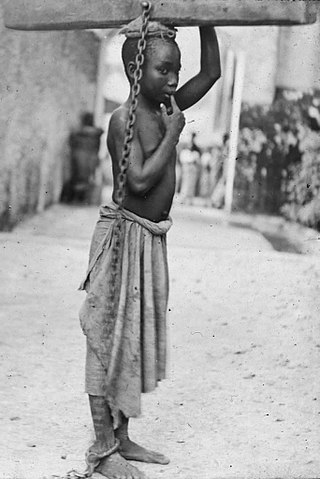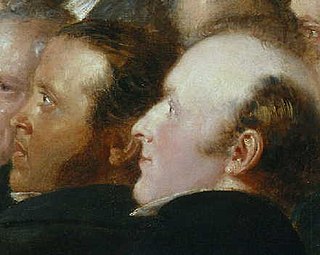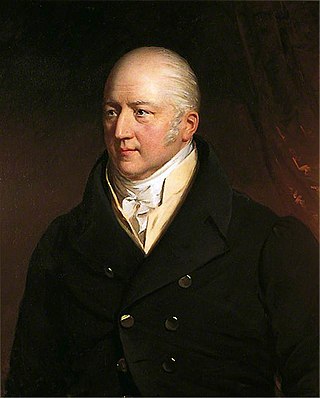
Abolitionism, or the abolitionist movement, is the movement to end slavery and liberate slaves around the world.

The Danish West Indies or Danish Virgin Islands or Danish Antilles were a Danish colony in the Caribbean, consisting of the islands of Saint Thomas with 32 square miles (83 km2); Saint John with 19 square miles (49 km2); and Saint Croix with 84 square miles (220 km2). The islands have belonged to the United States as the Virgin Islands since they were purchased in 1917. Water Island was part of the Danish West Indies until 1905, when the Danish state sold it to the East Asiatic Company, a private shipping company.

Eric Eustace Williams was a Trinidad and Tobago politician who is regarded by some as the "Father of the Nation", having led the then British Colony of Trinidad and Tobago to majority rule on 28 October 1956, to independence on 31 August 1962, and republic status on 1 August 1976, leading an unbroken string of general elections victories with his political party, the People's National Movement, until his death in 1981. He was the first Prime Minister of Trinidad and Tobago and also a noted Caribbean historian, especially for his book entitled Capitalism and Slavery.

The Baptist War, also known as the Sam Sharp Rebellion, the Christmas Rebellion, the Christmas Uprising and the Great Jamaican Slave Revolt of 1831–32, was an eleven-day rebellion that started on 25 December 1831 and involved up to 60,000 of the 300,000 slaves in the Colony of Jamaica. The uprising was led by a black Baptist deacon, Samuel Sharpe, and waged largely by his followers. The revolt, though militarily unsuccessful, played a major part in the abolition of slavery throughout the British Empire.

The emancipation of the British West Indies refers to the abolition of slavery in Britain's colonies in the West Indies during the 1830s. The British government passed the Slavery Abolition Act in 1833, which emancipated all slaves in the British West Indies. After emancipation, a system of apprenticeship was established, where emancipated slaves were required by the various colonial assemblies to continue working for their former masters for a period of four to six years in exchange for provisions. The system of apprenticeship was abolished by the various colonial assemblies in 1838, after pressure from the British public, completing the process of emancipation. These were the steps taken by British West Indian planters to solve the labour problems created by the emancipation of the enslaved Africans in 1838.

The coastwise slave trade existed along the southern and eastern coastal areas of the United States in the antebellum years prior to 1861. Hundreds of vessels of various capacities domestically traded loads of slaves along waterways, generally from the Upper South which had a surplus of slaves to the Deep South where new cotton plantations created high demand for labor.

The Slavery Abolition Act 1833 was an Act of the Parliament of the United Kingdom which provided for the gradual abolition of slavery in most parts of the British Empire. It was passed by Earl Grey's reforming administration and expanded the jurisdiction of the Slave Trade Act 1807 and made the purchase or ownership of slaves illegal within the British Empire, with the exception of "the Territories in the Possession of the East India Company", Ceylon, and Saint Helena. The Act came into force on 1 August 1834, and was repealed in 1998 as a part of wider rationalisation of English statute law; however, later anti-slavery legislation remains in force.

Slavery in the British and French Caribbean refers to slavery in the parts of the Caribbean dominated by France or the British Empire.

John Scoble was a Congregational minister, British abolitionist and political figure in Canada West.

The Slave Compensation Act 1837 was an Act of Parliament in the United Kingdom, signed into law on 23 December 1837.

The Sugar Duties Acts 1846 were statutes of the United Kingdom which equalized import duties for sugar from British colonies. They were passed in 1846 at the same time as the repeal of the Corn laws by the Importation Act 1846. The acts, combined with the recent abolition of slavery, had a devastating effect on the profits of the Caribbean plantocracy, which had previously enjoyed reduced import duties. The Sugar Duties Act 1846 was a replacement for the Sugar Duties Act 1846.

The British Leeward Islands was a British colony from 1671 to 1958, consisting of the English overseas possessions in the Leeward Islands. It ceased to exist from 1816 to 1833, during which time it was split into two separate colonies. It was dissolved in 1958 after the separation of the British Virgin Islands, and the remaining islands became parts of the West Indies Federation.

Mary Anne Rawson (1801–1887) was an abolitionist who also a campaigned with the Tract Society and the British and Foreign Bible Society, for Italian nationalism and against child labour. She was first involved with a Sheffield group, which successfully campaigned for people to boycott sugar from the West Indies, as it was produced by slave labour. She is pictured attending the World Anti-Slavery Convention in London in 1840.
The Indian Slavery Act, 1843, also known as Act V of 1843, was an act passed in British India under East India Company rule, which outlawed many economic transactions associated with slavery.

Charles Marryat was the Dean of Adelaide from 1887 until his death.

The Centre for the Study of the Legacies of British Slavery, formerly the Centre for the Study of the Legacies of British Slave-ownership, is a research centre of University College, London (UCL) that focuses on revealing the impact of British slavery and, in particular, the implications of the Slave Compensation Act 1837. The Centre's work is freely available online to the public through the Legacies of British Slavery database.

Joseph Marryat was an English West India merchant and banker, serving as an MP for Sandwich from 1812 until his death in 1824. He was a slave-owner and a strong opponent of abolitionism.
Colonel Thomas Moody (1779–1849) was a British geopolitical expert to the Colonial Office; Commander of the Royal Engineers; Home Secretary for Foreign Parliamentary Commissioners; Director of the British Royal Gunpowder Manufactory; and Director of the New Brunswick and Nova Scotia Land Company.

The planter class was a racial and socioeconomic caste which emerged in the Americas during European colonization in the early modern period. Members of the caste, most of whom were settlers of European descent, consisted of individuals who owned or were financially connected to plantations, large-scale farms devoted to the production of cash crops in high demand across Euro-American markets. These plantations were operated by the forced labour of slaves and indentured servants and typically existed in tropical climates, where the soil was fertile enough to handle the intensity of plantation agriculture. Cash crops produced on plantations owned by the planter class included tobacco, sugarcane, cotton, indigo, coffee, tea, cocoa, sisal, oil seeds, oil palms, hemp, rubber trees, and fruits. In North America, the planter class formed part of the American gentry.
Joseph Marryat was a British politician.














